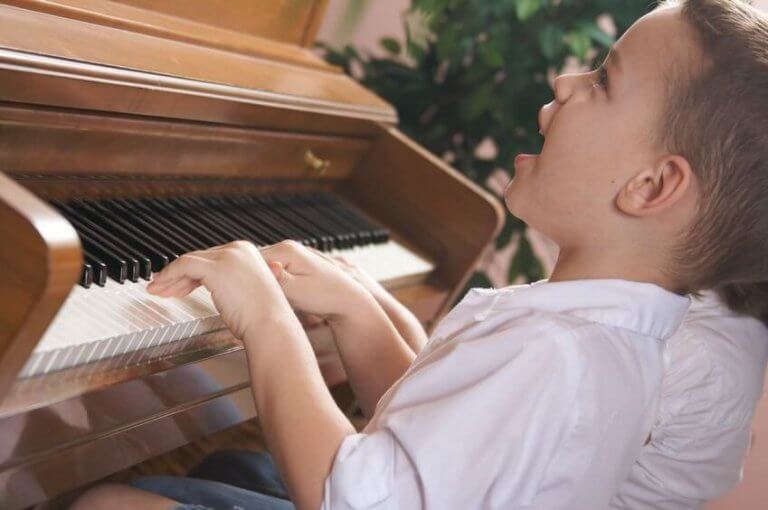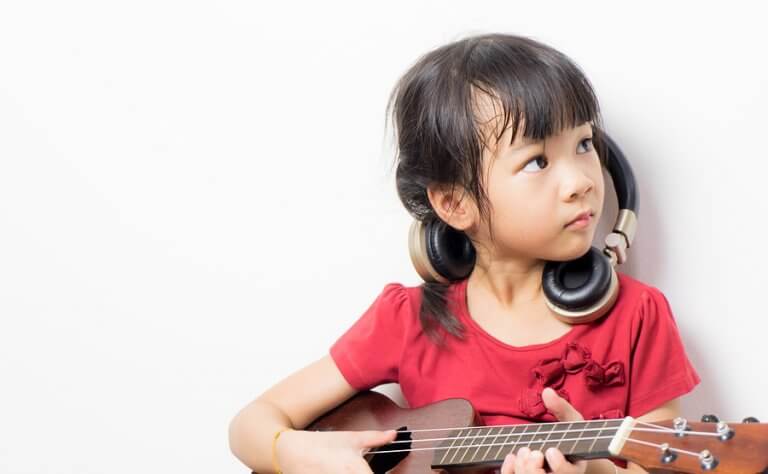The Benefits of Playing an Instrument During Childhood

There are many benefits of playing an instrument during childhood. It’s one of the best resources there is to develop children’s creativity and cognitive abilities. It also helps them build a sense of responsibility, teamwork, and partnership, among other benefits.
Why is playing an instrument during childhood important?
Learning to play a musical instrument, even as an adult, represents a valuable opportunity to train the ear, as well as develop motor skills and creativity. In addition, it can be an extracurricular activity that children love, and can perhaps be something they do professionally in the future.
The benefits of playing an instrument during childhood
Cognitive abilities
One of the main benefits of learning to play an instrument in childhood is the possibility of developing and improving children’s cognitive abilities significantly.
Playing an instrument has important effects on brain development. It also strengthens another set of abilities, including critical thinking and logic.
On the other hand, music stimulates neuronal activity, which makes the neurons much more efficient at transmitting various signals. Children who learn to play the guitar, the piano, or any other instrument also develop better concentration.
Coordination
The possibility of playing an instrument like the violin, the piano, or the guitar, among others, improves children’s coordination skills. The main reason is that in most cases this type of activity requires coordinated hand movements. It also sharpens their hearing and vision at the same time.

Stress reduction
Although it may seem hard to believe, children experience stressful situations just like adults. Playing an instrument is one of the best options for kids to relax as they connect to one another and concentrate on learning music.
When people concentrate on reading music and on where to put their hands, their minds relax and they forget about everything that was worrying them.
Emotional well-being
Learning how to play a musical instrument and doing so regularly promotes emotional well-being for both kids and adults. It’s important that children enjoy the activity so they can release all their pent-up energy and feel better about themselves.
Improved memory
Another major benefit of learning music is that it develops and improves the memory. For example, various scientific studies have indicated that music is one of the most effective tools for prevention and treatment of Alzheimer’s.
Even adults who suffer from Alzheimer’s have seen mild improvement in their cognitive abilities with music. They remember the songs and connect with the emotions they express.
Language skills
Another skill that learning and practicing music reinforces is language. Song lyrics, in addition to the musical instruments themselves, are wonderful tools that help kids broaden their vocabulary. It also stimulates correct use of the tongue.
Confidence
Practicing a musical instrument can develop great confidence in children. This, in turn, reinforces their self-esteem. They’re then better able to face the challenges and problems in their lives in a more positive, secure manner.
“Although it may seem hard to believe, children experience stressful situations just like adults. Playing an instrument is one of the best options to help kids relax.”
Social skills
Learning a musical instrument also strengthens social skills. Why? Because children learn from the beginning to relate more effectively with others.
This healthy self-esteem and self-confidence helps children become less afraid of making new friends.

Sense of responsibility
Learning to play an instrument develops a sense of responsibility in children. Children have to complete all their assigned practice and work to be able to improve, even more so if they play in a group with other kids.
In that situation, they have to be responsible and punctual, both for their own development and the benefit of the group.
As we’ve seen, playing an instrument during childhood has a lot of benefits. It’s an extracurricular activity that helps even the littlest kids develop their skills to the max. Don’t hesitate to encourage them to choose an instrument now!
There are many benefits of playing an instrument during childhood. It’s one of the best resources there is to develop children’s creativity and cognitive abilities. It also helps them build a sense of responsibility, teamwork, and partnership, among other benefits.
Why is playing an instrument during childhood important?
Learning to play a musical instrument, even as an adult, represents a valuable opportunity to train the ear, as well as develop motor skills and creativity. In addition, it can be an extracurricular activity that children love, and can perhaps be something they do professionally in the future.
The benefits of playing an instrument during childhood
Cognitive abilities
One of the main benefits of learning to play an instrument in childhood is the possibility of developing and improving children’s cognitive abilities significantly.
Playing an instrument has important effects on brain development. It also strengthens another set of abilities, including critical thinking and logic.
On the other hand, music stimulates neuronal activity, which makes the neurons much more efficient at transmitting various signals. Children who learn to play the guitar, the piano, or any other instrument also develop better concentration.
Coordination
The possibility of playing an instrument like the violin, the piano, or the guitar, among others, improves children’s coordination skills. The main reason is that in most cases this type of activity requires coordinated hand movements. It also sharpens their hearing and vision at the same time.

Stress reduction
Although it may seem hard to believe, children experience stressful situations just like adults. Playing an instrument is one of the best options for kids to relax as they connect to one another and concentrate on learning music.
When people concentrate on reading music and on where to put their hands, their minds relax and they forget about everything that was worrying them.
Emotional well-being
Learning how to play a musical instrument and doing so regularly promotes emotional well-being for both kids and adults. It’s important that children enjoy the activity so they can release all their pent-up energy and feel better about themselves.
Improved memory
Another major benefit of learning music is that it develops and improves the memory. For example, various scientific studies have indicated that music is one of the most effective tools for prevention and treatment of Alzheimer’s.
Even adults who suffer from Alzheimer’s have seen mild improvement in their cognitive abilities with music. They remember the songs and connect with the emotions they express.
Language skills
Another skill that learning and practicing music reinforces is language. Song lyrics, in addition to the musical instruments themselves, are wonderful tools that help kids broaden their vocabulary. It also stimulates correct use of the tongue.
Confidence
Practicing a musical instrument can develop great confidence in children. This, in turn, reinforces their self-esteem. They’re then better able to face the challenges and problems in their lives in a more positive, secure manner.
“Although it may seem hard to believe, children experience stressful situations just like adults. Playing an instrument is one of the best options to help kids relax.”
Social skills
Learning a musical instrument also strengthens social skills. Why? Because children learn from the beginning to relate more effectively with others.
This healthy self-esteem and self-confidence helps children become less afraid of making new friends.

Sense of responsibility
Learning to play an instrument develops a sense of responsibility in children. Children have to complete all their assigned practice and work to be able to improve, even more so if they play in a group with other kids.
In that situation, they have to be responsible and punctual, both for their own development and the benefit of the group.
As we’ve seen, playing an instrument during childhood has a lot of benefits. It’s an extracurricular activity that helps even the littlest kids develop their skills to the max. Don’t hesitate to encourage them to choose an instrument now!
All cited sources were thoroughly reviewed by our team to ensure their quality, reliability, currency, and validity. The bibliography of this article was considered reliable and of academic or scientific accuracy.
- Tobar, C. (2013). Beneficios de la música en el aprendizaje. Revista EducAcción, 18, 34-35. http://www.usfq.edu.ec/publicaciones/para_el_aula/Documents/para_el_aula_06/0018_para_el_aula_06.pdf
- Benítez, M. A., Abrahan, V. M. D., & Justel, N. R. (2018). Beneficios del entrenamiento musical en el desarrollo infantil: una revisión sistemática. Revista Internacional de Educación Musical, (5), 61-69. http://www.revistaeducacionmusical.org/index.php/rem1/article/view/100
- Román García, M. S. (2003). Beneficios del aprendizaje músico-instrumental Los paradigmas Suzuki y Yamaha. https://rodin.uca.es/xmlui/bitstream/handle/10498/7762/32071644.pdf?sequence=1
- Albornoz, Y. (2009). Emoción, música y aprendizaje significativo. Educere, 13(44). https://www.redalyc.org:9444/error.xhtml?cid=306728
- Brewer, C. (1995). Music and learning: Integrating music in the classroom. Bellingham, WA: LifeSounds.
- Mantilla, D. (2012). La influencia de la musica en el aprendizaje infantil. 1 de Noviembre.
- Tobar, C. (2013). Beneficios de la música en el aprendizaje. Revista EducAcción, 18, 34-35. http://www.usfq.edu.ec/publicaciones/para_el_aula/Documents/para_el_aula_06/0018_para_el_aula_06.pdf
- Vargas, R., & María, K. (2010). La educación musical y su impacto en el desarrollo. Revista de educación y desarrollo, 53-60. http://www.cucs.udg.mx/revistas/edu_desarrollo/anteriores/12/012_Reynoso.pdf
This text is provided for informational purposes only and does not replace consultation with a professional. If in doubt, consult your specialist.








